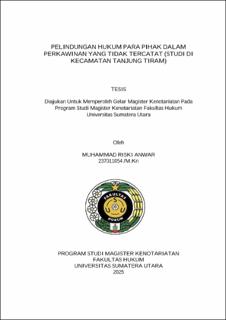Pelindungan Hukum Para Pihak dalam Perkawinan yang Tidak Tercatat (Studi di Kecamatan Tanjung Tiram)
Legal Protection of Parties in Unregistered Marriage (A Study in Tanjung Tiram Sub-District)

Date
2025Author
Anwar, Muhammad Riski
Advisor(s)
Thaib, Zamakhsyari Bin Hasballah
Barus, Utary Maharany
Metadata
Show full item recordAbstract
Marriage in Indonesia is regulated under Law Number 16 of 2019, which amends Law Number 1 of 1974 on Marriage. This law emphasizes that marriage is a physical and spiritual bond between a man and a woman with the aim of forming a happy and eternal family based on belief in Almighty God. One of the crucial aspects of marriage regulation is the obligation to register the marriage as an administrative requirement, despite its religious validity, However, in practice, unregistered marriages still occur, as found in Tanjung Tiram Sub-District, Batu Bara Regency. The absence of marriage registration can lead to Various legal difficulties, particularly concerning the protection of the rights of the parties involved.
Based on this issue, the present study aims to identify the factors leading to unregistered marriages in Tanjung Tiram Sub-District, examine the government's oversight of such marriages, and analyze the legal protection available for spouses in unregistered marriages in the community. This study employs an empirical juridical research method to directly examine the issue of unregistered marriages in Tanjung Tiram Sub-District, with a prescriptive nature. The sources of data include primary, secondary, and tertiary data, collected through a literature review and, field research approach.
The findings of this study indicate that the primary factors contributing to unregistered marriages include tradition, procedural convenience, bureaucratic obstacles, economic limitations, and lack of legal awareness. Consequently, the legal status of wives and children remains unclear, affecting their rights to maintenance, inheritance, and legal protection. The roles of the Office of Religious Affairs (KUA), sub-district and village governments, community leaders, and the Indonesian Ulema Council (MUI) are crucial in monitoring unregistered marriages; however, administrative challenges and registration costs pose significant obstacles. Two available solutions for obtaining legal protection are isbat nikah (marriage legalization) and remarriage. The community in Tanjung Tiram Sub-District tends to prefer isbat nikah due o` social and administrative considerations. Integrated court sessions have been proposed as a legal resolution by the Religious Court. This study recommends enhanced coordination among institutions and improved access to marriage registration to reduce the occurrence of unregistered marriages and provide better legal protection.
Collections
- Master Theses (Notary) [2330]
